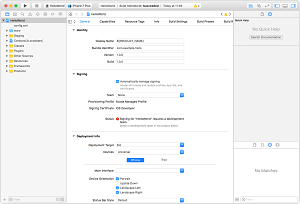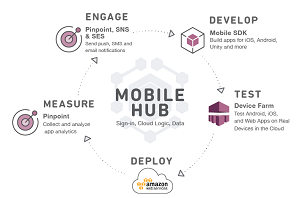News
Ionic Partners with AWS for Mobile Back-End Starter Project on GitHub
- By David Ramel
- May 10, 2017
Ionic is known for its open source framework and associated development tools that can create native mobile apps with one codebase based on AngularJS, Apache Cordova and JavaScript/CSS Web technologies.
To help Ionic developers navigate the intricacies of cloud-hosted services to support such apps with back-end functionality -- such as storage, databases, security, user management and more -- Ionic teamed up with Amazon Web Services Inc. (AWS) on a starter mobile app they hosted on GitHub.
Called Ionic AWS Starter, the app lets developers import a ready-to-go AWS Mobile Hub project that provides the aforementioned back-end functionality.
In this case, that functionality consists of: Amazon DynamoDB for the database, Amazon S3 for the storage, Amazon Pinpoint for user engagement and analytics, and Amazon Cognito for user sign-up and authentication.
 [Click on image for larger view.]
An Ionic App in the Xcode IDE (source: Ionic)
[Click on image for larger view.]
An Ionic App in the Xcode IDE (source: Ionic)
In a blog post, Ionic said "Our developers often tell us that it's challenging navigating the landscape of mobile-enabled back-end services, and they don't know where to turn after generating and building out the first few bits of their Ionic apps.
"To help developers get over this hurdle, we've partnered up with the AWS Mobile Team to build the official Ionic AWS starter project."
The GitHub project requires the use of command-line interface (CLI) tools from Ionic and AWS for initial setup and then the Mobile Hub Console to import the pre-configured back-end functionality.
 [Click on image for larger view.]
AWS Mobile Hub (source: AWS)
[Click on image for larger view.]
AWS Mobile Hub (source: AWS)
"Developers import the Mobile Hub project in their AWS console, with a drag-and-drop interface, and all of the back-end services will automatically be instantiated and provisioned," AWS said in its own blog post. "The cloned project will reproduce the original with a freshly provisioned set of AWS resources. A configuration file for the Ionic application to consume is automatically created for either deployment to device or in a Mobile Web scenario.
"With the ability to capture and redeploy a stable, known backend, potential for errors and the scope of any debugging/testing are substantially reduced. Ionic developers can focus on the sample application mobile front-end."
Although the GitHub project's README file contains iOS-centric guidance, Ionic says its dev tooling can create native mobile apps for every major app store.
"This is our first go at creating a front-to-back Ionic starter project and we're hoping it gets you running faster than ever before," Ionic said. "We'd love your feedback on the new AWS starter, and please let us know if there's anything we can improve on or features you'd like to see."
About the Author
David Ramel is an editor and writer at Converge 360.